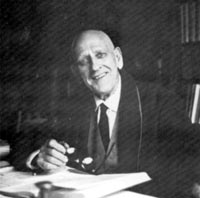Demiéville, P.
| English Phonetics | Paul Demiéville |
|---|
| Birth: | 1894/09/13 |
|---|---|
| Death: | 1979/03/23 |
Tibetan calendar dates
Biographical Information
Paul Demiéville (13 September 1894 – 23 March 1979) was a Swiss-French sinologist and Orientalist known for his studies of the Dunhuang manuscripts and Buddhism and his translations of Chinese poetry, as well as for his 30-year tenure as co-editor of T'oung Pao.
Demiéville was one of the foremost sinologists of the first half of the 20th century, and was known for his wide-ranging contributions to Chinese and Buddhist scholarship. His influence on Chinese scholarship in France was particularly profound, as he was the only major French sinologist to survive World War II.
Demiéville was one of the first sinologists to learn Japanese to augment their study of China: prior to the early 20th century, most scholars of China learned Manchu as their second scholarly language, but Demiéville's study of Japanese instead was soon followed by nearly every major sinologist since his day. (Source Accessed Jul 21, 2020)
- Wiki Pages
- Person description or short bio
Expand to see this person's philosophical positions on Buddha-nature.
| Is Buddha-nature considered definitive or provisional? | |
|---|---|
| Position: | |
| Notes: | |
| All beings have Buddha-nature | |
| Position: | |
| If "Qualified", explain: | |
| Notes: | |
| Which Wheel Turning | |
| Position: | |
| Notes: | |
| Yogācāra vs Madhyamaka | |
| Position: | |
| Notes: | |
| Zhentong vs Rangtong | |
| Position: | |
| Notes: | |
| Promotes how many vehicles? | |
| Position: | |
| Notes: | |
| Analytic vs Meditative Tradition | |
| Position: | |
| Notes: | |
| What is Buddha-nature? | |
| Position: | |
| Notes: | |
| Svātantrika (རང་རྒྱུད་) vs Prāsaṅgika (ཐལ་འགྱུར་པ་) | |
| Position: | |
| Notes: | |
| Causal nature of the vajrapāda | |
| Position: | |
